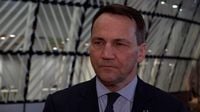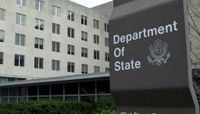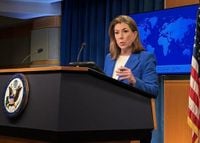The ongoing conflict between Ukraine and Russia continues to draw international attention, as U.S. officials emphasize the need for tough negotiations and compromises from both sides. On March 31, 2025, U.S. State Department spokeswoman Temmi Brueus addressed the media, reiterating the Biden administration's stance against Russia's proposal for temporary governance over Ukraine under United Nations auspices. Brueus made it clear that the U.S. does not accept the idea of external governance, stating, "I don't think I need to lecture everyone, but this is a clear reminder: Ukraine is a constitutional democracy. Interference in Ukraine means interfering with its Constitution and the Ukrainian people."
This statement comes amid heightened tensions following remarks from Russian President Vladimir Putin, who suggested a temporary governing arrangement for Ukraine. Brueus emphasized that the focus for the U.S. is on facilitating a peaceful resolution to the conflict, urging both Moscow and Kyiv to engage in negotiations. "We are working with Russia and Ukraine, and we want to continue our work so that they can sit down at the negotiating table," she said.
Brueus also highlighted the importance of a full ceasefire, noting that President Trump has been clear about the necessity for both nations to halt hostilities. She stated, "President Trump clearly stated that Russia and Ukraine must immediately move to a full ceasefire, and nothing should change from this." This insistence on diplomacy and dialogue underscores the U.S. administration's commitment to finding a sustainable solution to the conflict.
Meanwhile, Polish Foreign Minister Radislav Sikorskyi also weighed in on the situation during a press briefing in Madrid on the same day. He asserted that the decision regarding foreign troop presence in Ukraine lies solely with Ukraine, stating, "Ukraine decides whether and which foreign troops should be stationed on its territory, Ukraine and no one else." Sikorskyi's comments came ahead of a meeting with European counterparts from Spain, France, Germany, Italy, and Great Britain to discuss a peace plan for Ukraine.
Sikorskyi emphasized that any discussions about peacekeepers are premature, given the lack of a ceasefire. "We should not talk about peace when protection is needed," he remarked. His statements reflect the ongoing complexities in the negotiations, as both sides grapple with the realities on the ground.
On March 27, 2025, leaders from 27 countries convened in Paris to discuss potential guarantees for Ukraine following a possible end to hostilities. French President Emmanuel Macron announced that a French-British military delegation would soon arrive in Ukraine to assess the situation. This delegation, led by the chiefs of staff of both nations, is tasked with determining the necessary format for the Ukrainian Armed Forces across land, air, and sea operations, including personnel numbers and equipment needs.
Macron clarified that any Western contingents proposed by the coalition would not be stationed on the front line but rather in strategic locations within a peaceful zone, acting as support forces. This approach aims to provide security without escalating tensions further.
The discussions among global leaders and U.S. officials underscore the urgent need for a diplomatic resolution to the conflict. The ongoing war has created a humanitarian crisis, with millions of Ukrainians displaced and in need of assistance. As the international community continues to navigate these complex dynamics, the call for a ceasefire and negotiations remains paramount.
Brueus's remarks reflect a broader consensus among U.S. officials that both Ukraine and Russia must engage in serious discussions to resolve their differences. As the situation evolves, the emphasis on Ukraine's sovereignty and democratic governance remains a cornerstone of U.S. policy.
In conclusion, the U.S. administration's firm stance against external governance of Ukraine, coupled with calls for a ceasefire and negotiation, highlights the complexities of the ongoing conflict. With international leaders actively seeking solutions, the hope for a peaceful resolution remains a critical focus as both sides navigate the path forward.






